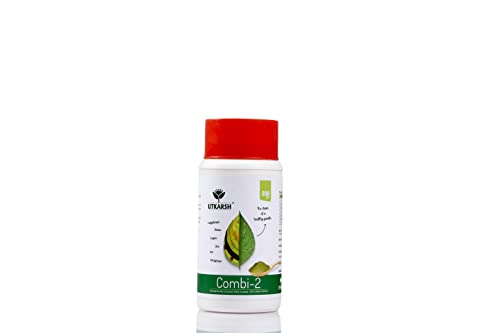-
Crystal Talwar Zinc Super-14 Plant Nutrition (500) gm
Regular price Rs. 500.00Regular priceUnit price / perRs. 530.00Sale price Rs. 500.00Sale -
Agri junction one stop 24Product name :-Libra Bhoomiputra
Regular price Rs. 140.00Regular priceUnit price / perRs. 185.00Sale price Rs. 140.00Sale -
YaraVita Zintrac 700 Zinc 39.5% Liquid Spray Plant Growth Fertilizer for All Plants
Regular price Rs. 1,286.00Regular priceUnit price / perRs. 1,830.00Sale price Rs. 1,286.00Sale -
YaraVita Zintrac 700 (Zinc Oxide Suspension Concentrate 39.5% Zn)
Regular price Rs. 900.00Regular priceUnit price / perRs. 920.00Sale price Rs. 900.00Sale -

YaraVita Zintrac 700 |Zinc 39.5% Liquid Spray | Plant Growth Fertilizer | Eliminate Zinc Deficiency
Regular price Rs. 1,286.00Regular priceUnit price / perRs. 1,830.00Sale price Rs. 1,286.00Sale -
Biogreen Zinc Plus _ 500ML
Regular price Rs. 1,050.00Regular priceUnit price / per -
UPL Copio 3 kg - Soil Probiotics, A Multi Species Product
Regular price Rs. 490.00Regular priceUnit price / perRs. 800.00Sale price Rs. 490.00Sale -
UPL Copio 3 kg - Soil Probiotics, A Multi Species Product
Regular price Rs. 490.00Regular priceUnit price / perRs. 800.00Sale price Rs. 490.00Sale -
 Sale
SaleEpsom Salt 1kg
Regular price Rs. 350.00Regular priceUnit price / perRs. 550.00Sale price Rs. 350.00Sale -
K Max Super (Organic Manure/ Arbuscular Mycorrhizae Fungi / An innovative and unique Bio Fertilizer from Krishi Rasayan Exports Pvt Ltd in association with Alga Energy Spain) (4 KG)
Regular price Rs. 850.00Regular priceUnit price / perRs. 900.00Sale price Rs. 850.00Sale -
 Sale
SaleVAM 100 gram
Regular price Rs. 125.00Regular priceUnit price / perRs. 150.00Sale price Rs. 125.00Sale -
Dr. Bacto's VAM - Talcum Based Mycorrhiza
Regular price Rs. 475.00Regular priceUnit price / perRs. 540.00Sale price Rs. 475.00Sale -
IFFCO Nano Urea Liquid: Small drops, big yields.
Regular price Rs. 230.00Regular priceUnit price / perRs. 250.00Sale price Rs. 230.00Sale -
Nano Urea: Chhota Packet, Bada Dhamaka!
Regular price Rs. 170.00Regular priceUnit price / perRs. 250.00Sale price Rs. 170.00Sale -
IFFCO Nano DAP: Nurture Your Crops, Multiply Your Harvest
Regular price Rs. 697.00Regular priceUnit price / perRs. 800.00Sale price Rs. 697.00Sale -
Yellowing Leaves? Weak Growth? Supercharge Your Crops with This Iron & Micronutrient Combo (Save Now!)
Regular price Rs. 550.00Regular priceUnit price / perRs. 830.00Sale price Rs. 550.00Sale
Collection: Fertilizer balance in Chili crop
Integrated nutrient management (INM) in chilli cultivation is a holistic approach to nutrient management that combines the use of organic and inorganic fertilizers to improve soil fertility and crop productivity.
Role of soil texture
Soil texture plays an important role in chilli cultivation. Chilli plants prefer well-drained, loamy soils with a pH of 6.0 to 7.0. Heavy soils can lead to waterlogging and root rot, while sandy soils can leach nutrients easily.
Chemical fertilizers
Chemical fertilizers are inorganic fertilizers that provide nutrients to plants in a readily available form. They are commonly used in chilli cultivation to supplement the nutrients provided by organic fertilizers.
The main chemical fertilizers used in chilli cultivation are nitrogen (N), phosphorus (P), and potassium (K). N is essential for plant growth and development. P is essential for root growth and seed production. K is essential for water use efficiency and crop quality.
Biofertilizers
Biofertilizers are living microorganisms that can help to improve nutrient availability and uptake by plants. They are a valuable addition to INM programs for chilli cultivation.
Some examples of biofertilizers that can be used for chilli cultivation include:
- Rhizobium: Rhizobium bacteria form a symbiotic relationship with chilli plants and help them to fix atmospheric nitrogen.
- Phosphate-solubilizing bacteria: Phosphate-solubilizing bacteria help to solubilize phosphorus in the soil, making it more available to chilli plants.
- Potash-solubilizing bacteria: Potash-solubilizing bacteria help to solubilize potassium in the soil, making it more available to chilli plants.
Organic fertilizers
Organic fertilizers are derived from plant and animal materials. They are a good source of N, P, K, and other essential nutrients. Organic fertilizers also help to improve soil structure and water-holding capacity.
Some examples of organic fertilizers that can be used for chilli cultivation include:
- Farmyard manure
- Compost
- Green manure
- Crop residues
Nano fertilizers
Nano fertilizers are fertilizers that are made up of nanoparticles. Nanoparticles are smaller than 100 nanometers in size. Nano fertilizers are more efficient than traditional fertilizers because they are more easily absorbed by plants.
Research is ongoing to develop nano fertilizers for chilli cultivation. Nano fertilizers have the potential to increase chilli yield and reduce fertilizer costs.
Integrated nutrient management (INM) practices for chilli cultivation
Here are some INM practices that can be used for chilli cultivation:
- Apply a balanced dose of chemical fertilizers: The recommended dose of chemical fertilizers for chilli varies depending on the soil type and fertility status. It is important to get a soil test done to determine the fertilizer requirements of your field.
- Use biofertilizers: Biofertilizers can be applied to the soil or to the seeds. They can also be sprayed on the plants.
- Apply organic fertilizers: Organic fertilizers should be applied to the soil before planting and during the growing season.
- Rotate crops: Crop rotation helps to improve soil fertility and reduce pest and disease problems.
Benefits of INM in chilli cultivation
INM has a number of benefits for chilli cultivation, including:
- Increased crop yield
- Improved soil fertility
- Reduced environmental impact
- Reduced fertilizer costs
Conclusion
INM is an important approach to nutrient management in chilli cultivation. INM can help to improve crop yield, improve soil fertility, reduce environmental impact, and reduce fertilizer costs.
By following the INM practices outlined above, chilli farmers can improve the productivity and profitability of their crops.
















